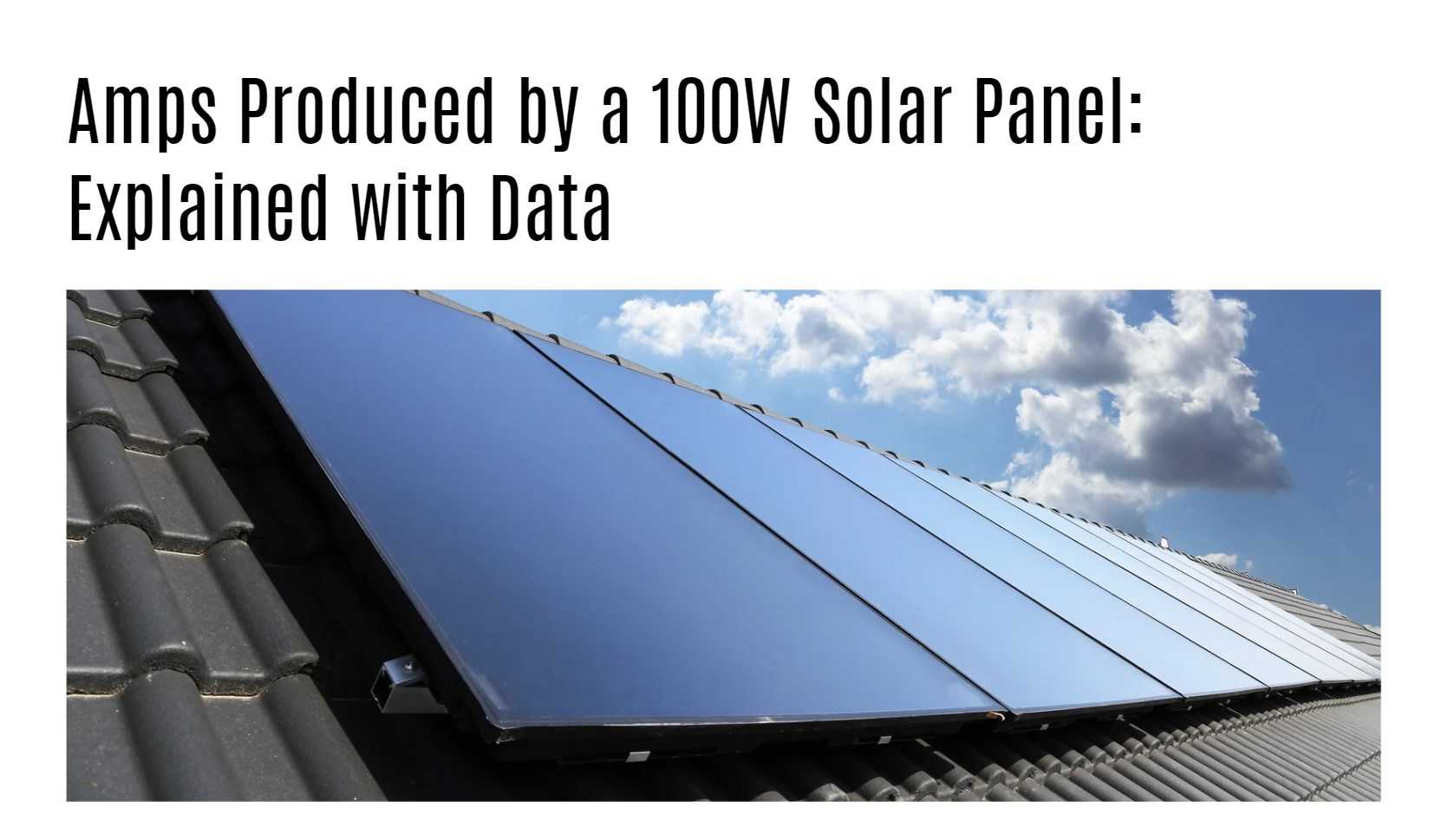Solar panels play a crucial role in harnessing solar energy and converting it into electricity. In this article, we will explore the amps produced by a 100-watt solar panel and provide easy-to-understand information supported by data. Additionally, we will answer the top 10 questions that practitioners in the energy storage or solar industry may have.
Crystalline silicon solar cells, made from layers of silicon, phosphorus, and boron, are commonly used in solar panels. These cells are arranged in a grid pattern, and a single solar panel is composed of multiple cells. The solar cells are responsible for converting sunlight into electricity.
The solar panel is enclosed in a protective frame, with a non-reflective glass cover that shields the cells from damage while allowing sunlight to pass through. The back of the panel is also sealed to provide additional protection.
What are Watts in Solar Panels?
Solar panels are rated in terms of watts, which represents their power generation capacity. A 100-watt solar panel, under ideal conditions, can generate 100 watts of direct current (DC) power. The actual output may vary depending on various factors.
To determine the amps produced by a 100-watt solar panel, we can divide the wattage by the maximum voltage output. For example, a typical 100-watt solar panel with a maximum voltage output of 18 volts would produce approximately 5.5 amps.
Calculating Amps:
To calculate the amps produced by a solar panel, divide the total wattage output by the panel’s maximum voltage (Vmp). This will give you the current output in amps.
Factors Affecting Solar Panel Ratings:
When comparing solar panels, it’s important to consider factors beyond wattage. Solar panel efficiency, durability, warranties, and cost are all important aspects to consider. High-efficiency panels can generate more power using less space, while warranties provide assurance of long-term performance.
Efficiency:
Solar panel efficiency refers to the percentage of sunlight that is converted into electricity. The majority of solar panels on the market have efficiency ratings between 14% and 23%. Higher efficiency panels can generate more power in limited space.
Wattage:
Wattage represents the power output of a solar panel under ideal conditions. It is calculated by multiplying the amps by the volts. Solar panels for home and commercial use typically have wattages in the 300s or low 400s.
Understanding Amps in Solar Panels:
Amps, volts, and watts are interrelated units of measurement in solar panels. Amps measure the rate of electrical current flow, volts measure the force or pressure that causes electrons to flow, and watts represent the power output.
Why Calculating Amps is Important:
Understanding the amps produced by solar panels is crucial for estimating the power requirements of devices. By knowing the amps, volts, watts, or amp-hours required by an appliance, you can determine the size and quantity of solar panels needed for optimal performance.
How Many Batteries Can a 100-Watt Solar Panel Charge?
The number of batteries a 100-watt solar panel can charge depends on the battery capacity and the energy needs of the system. For example, a single 100-watt solar panel can effectively charge a 12V battery with a capacity of 100Ah. If you require more energy storage, you may need additional batteries or a more powerful battery.
Types of Batteries:
Deep-cycle batteries, such as lead-acid and lithium-ion batteries, are commonly used in solar systems. Lead-acid batteries are more affordable but should not be discharged below 50% capacity for optimal performance. Lithium-ion batteries, although more expensive, offer greater longevity and energy storage capacity.
Can a 100-Watt Solar Panel Power a TV?
A 100-watt solar panel can power a TV, but the size and type of TV must be considered. LED TVs, which are energy-efficient, can be powered by a 100-watt solar panel up to 40 inches in size. However, larger TVs or those with higher power requirements may require more powerful solar panels.

FAQs
How many amps does a 100 watt solar panel produce?
- Ideal Conditions: A 100 watt solar panel can produce up to 8.33 amps of current in ideal conditions, calculated using the formula Amps = Watts / Volts.
- Realistic Conditions: In realistic conditions, the amp output may vary due to factors like temperature, cloud cover, and panel efficiency. At 90% efficiency, the amp output can be around 7.50 amps.
- Factors to Consider: When estimating the amp output of a 100 watt solar panel, it’s important to consider factors like temperature, cloud cover, and the efficiency of the panel.
What is the actual output of a 100 watt solar panel?
- Real-World Testing: A 100 watt solar panel was tested over a 10-day period, producing an average of 431 watt hours per day.
- Energy Production Range: The actual output of a 100 watt solar panel can vary between 300 to 500 watt hours per day, depending on factors like location, shading, weather conditions, and time of year.
- Factors Influencing Output: Location, shading, weather conditions, and time of year play a significant role in determining the energy production of a 100 watt solar panel.
How many amp hours can I get from a 100 watt solar panel?
- Maximum Amp Output: A 100 watt solar panel can generate a maximum of 8.3 amps of current assuming 100% efficiency.
- Factors Influencing Amp Hours: Sunlight exposure, solar cell count, and solar panel efficiency can impact the actual amp hours obtained from a 100 watt solar panel.
- Optimizing Efficiency: To maximize the efficiency of a 100 watt solar panel, it’s recommended to clean the panels, maintain airflow, monitor the solar system, use solar batteries, and place the panels under direct sunlight.
How many 12V batteries can a 100W solar panel charge?
- Real-World Testing: A 100W solar panel can charge a 35Ah 12V battery in 5-6 hours, assuming sufficient sunlight availability.
- Factors Influencing Charging Capacity: Sunlight availability, battery depth of discharge (DoD) rate, and the type of battery used can impact the charging capacity of a 100W solar panel.
- Optimizing Battery Charging: Consider sunlight availability, battery DoD rate, and choose the appropriate battery type to maximize the charging capacity of a 100W solar panel.




